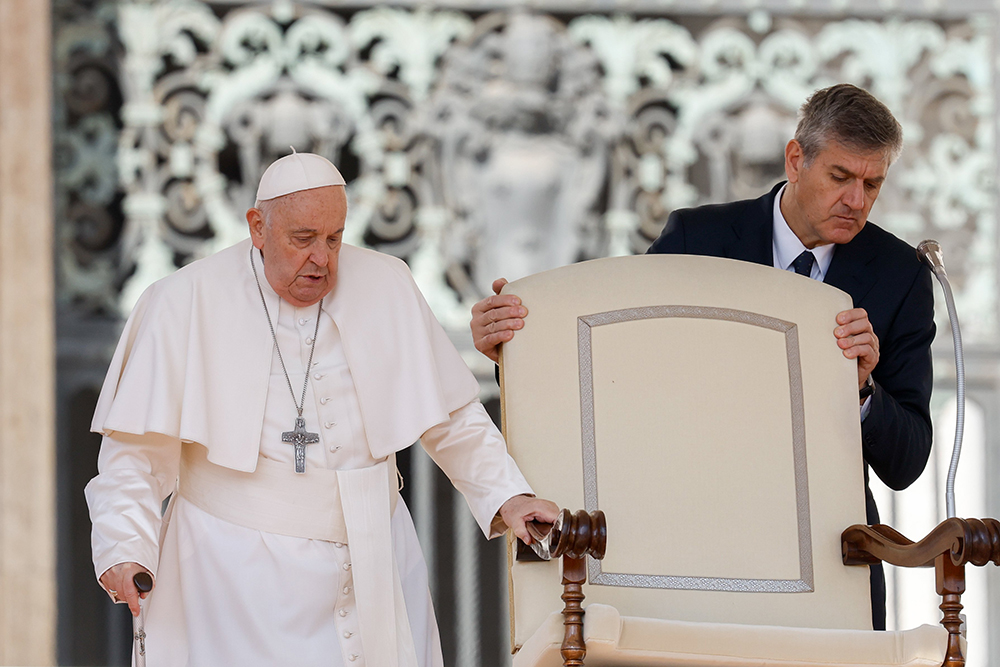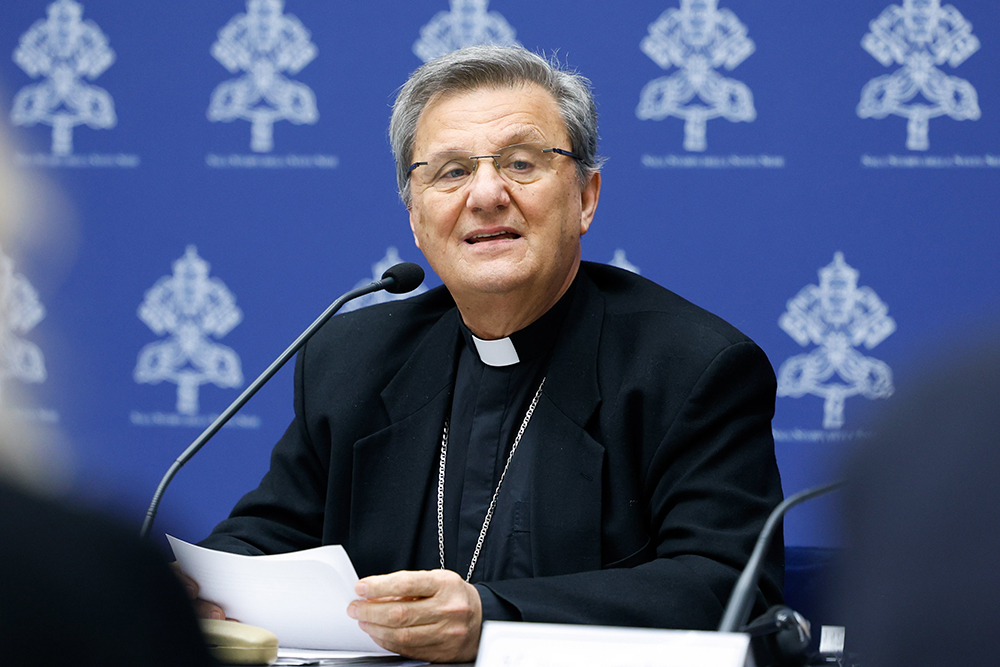
Pope Francis, walking with a cane, reaches his chair held by his aide, Sandro Mariotti, as he arrives for his weekly general audience in St. Peter's Square at the Vatican March 20, 2024. (CNS/Lola Gomez)
After raising expectations with his Synod on Synodality, Pope Francis is punting on a number of controversial issues that the synod process invited lay Catholics to raise. When the next session of the synod meets this October, the topics of married priests and same-sex blessings will be off the table, while the possibility of women deacons will be assigned to study groups. In effect, Francis is leaving his successor to resolve what he started.
The Synod on Synodality has been a three-year consultive process, gathering input from listening sessions all over the world. The synod's first meeting in Rome, which for the first time allowed lay men and women to vote alongside bishops, met last October in groups of 10 at roundtables for "conversations in the Spirit," in which everyone had an equal voice.
In November, the report on the October session gave recommendations to the pope and called for further research and discussion of certain topics. On March 14, the General Secretariat of the Synod gave the pope's response to the synod's report, laying out a game plan for the synod's future.
The secretariat made clear that the synod is about synodality, not other issues. The focus, the secretariat said, will "be the theme of everyone's participation, with our varied vocations, charisms and ministries, in the one mission of proclaiming Jesus Christ to the world." The synod, in other words, will be about how to be a synodal church and not about controversial issues.
Advertisement
The issues that many expected to be discussed this fall will instead be referred to 10 study groups of theologians, experts and Vatican offices. Most of these are huge topics that have been discussed for decades: priestly formation, relations between Eastern and Western churches, relations between bishops and religious, the poor, the role of the bishop, the role of papal nuncios, ecumenism.
There are already numerous Vatican documents on these topics as well, and even previous synods have been devoted to them. The hope is to approach them from a fresh, synodal perspective.
The issue of women deacons will be studied by a group dealing with theological and canonical questions about ministry. Another group will look at theological and synodal approaches to controversial doctrinal, pastoral and ethical issues.
The topic of one study group is new — the church's mission in the digital environment — but even that has been discussed in the Vatican for years.
All the study groups are supposed to complete their work by June 2025, but it is unlikely that any of these issues will be resolved during this papacy.
The synod could never have dealt with all of these issues, so it made sense to send some of them for further study. But institutions often avoid decisions by studying them to death. Perhaps the mistake is hoping for complete solutions rather than making incremental steps toward a solution.
Others were never going to be addressed by the upcoming synod session. In response to questions, Cardinal Mario Grech, general secretary of the Synod Secretariat, said the issue of married priests "has never been put on the table." As a result, it did not get assigned to any group for future study.
Grech is correct that few synod delegates raised the question of married priests, and it was not mentioned in the synod's report. They spent much more time discussing women deacons, pastoral outreach to LGBTQ+ and lay participation in church decision-making.

Cardinal Mario Grech, secretary-general of the Synod of Bishops, speaks at a news conference at the Vatican March 14, 2024, about study groups authorized by Pope Francis to examine issues raised at the synod on synodality. (CNS/Lola Gomez)
However, we should not forget that ordaining married men was a major issue at the 2019 Synod on the Amazon. That synod was told that the issue could not be resolved without wider consultation in the church. The Synod on Synodality should have been that consultation.
Shame on the synod delegates, then, for not raising the question. Perhaps it will be raised at the synodal consultation with 300 parish priests, to take place in Rome from April 28 to May 2. This will be the last chance to get it on the synod's agenda.
The blessing of same-sex couples will not be revisited, according to the secretariat, since the pope and the Dicastery for the Doctrine of the Faith have already dealt with the question in the document, "Fiducia supplicans." The pope does not want another food fight over this issue, which has put the African church at loggerheads with the European church.
The pope has always stressed that the synod is about synodality, not about controversial issues. He believes the church must become synodal before it can deal with these issues. We must learn to listen to one another, to have conversations in the Spirit, to learn how to discern the Spirit before tackling controversial issues.
I agree that a truly synodal church could more easily deal with these issues, but can we wait for this ideal church?
Alas, to many, a Synod on Synodality sounds like having a "meeting on meeting" to learn how to listen and discern. Such meetings drive practical Americans crazy because nothing gets done.
The difficulty is that the pope's ideal may be so high that the likelihood of us becoming a synodal church before the Parousia is negligible. It's like telling a family or community that they must love one another before coming to a decision. Such comradery in human institutions is rare.
I agree that a truly synodal church could more easily deal with these issues, but can we wait for this ideal church?
I am sympathetic to Francis' desire for a synodal church. It truly is important. The church needs to be a sign and instrument of unity in the world. The difficulty is that synodality cannot be communicated through words in a report. It must be experienced. Francis wants to include the entire church, beginning in parishes and dioceses, to experience synodality as if they were all in the synodal hall.
Can we not deal with important issues in the church while we are learning to be synodal? Certainly, we cannot become synodal while sweeping difficult questions under the rug. That is the opposite of synodality.
Meanwhile, I feel that I am on the Titanic while the crew meets to talk about how they should listen to one another. Millions of Catholics are leaving — it may not be long before Latin America is majority non-Catholic; the church in Europe has been on life support for decades; in the United States the church's future also looks grim.
None of this is Francis' fault; it was happening before he became pope. But there is a growing Eucharistic famine throughout the world, and church leaders refuse to employ more people to respond to this famine because they are married, female or gay. Many rural areas see a priest only rarely. Catholics turn to the only worship services available to them, ones by Pentecostal or other evangelical Christian ministers.
The Synod on Synodality is an experiment worth trying, but I fear that it will be a failure unless local bishops follow Francis' example and embrace synodality. I fear that the synod itself will produce very little, and any results will be up to the next pope. I hope and pray that I am wrong.







